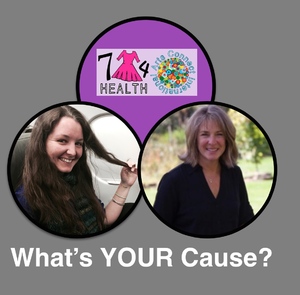DAY SEVENTY-TWO
Intro to Guest Blogger: As a nurse, health educator, and parent Kim Cook understands the impact sex-positive, comprehensive sexuality health communication can have on a young person’s future. Kim developed TeenWorldConfidential.com with a humorous approach to provide non-judgmental, medically accurate sexuality health information. This site offers parents the tools, knowledge, and additional resources that will enable parents and other adults to speak openly and honestly to the young people in their lives. You can find her on Facebook at TeenWorldConfidential, Twitter @TWConfidential, and LinkedIn as Kim Cook.
Title: Sexuality Health in the United States
In the United States, there has been an ongoing debate about what to teach our students regarding sexuality health.
Do we teach nothing and hope that parents address this complex subject in a factual manner? Communication between adolescents and the adults they trust, typically parents, is an essential component in forming values about sex, relationships, and reproductive health. Parents are also a child’s primary source of overall health information. However some topics may be a little more difficult to discuss that others. Everything from anal sex to sexually transmitted infections (STIs) to sexual orientation need to be honestly addressed.
I imagine either the child or parent will come away with a look on their face that resembles this overwhelmed woman.
Do we teach abstinence-only, which dictates individuals must wait until marriage to become
sexually active, therefore any further conversation about STIs and contraception is silenced? Yes, abstinence is indeed the only 100% way to prevent pregnancy and STIs - when used properly! How can abstinence not be used properly? When it is not used at all. Because supplementary information about protection is not taught, these individuals risk pregnancy and STIs. In fact 95% of the population will have sex before marriage. Even more relevant, according to the CDC almost half of high school students report having sex before graduation.
It is best not to view our adolescents as inquisitive toddlers. They know more than you think they do.
Do we teach comprehensive sexuality education (CSE), which features abstinence? Medically-accurate information about birth control, facts about sexually transmitted infections (STIs), and safer sex practices are taught as well. Identity, gender equality, decision-making skills, recognizing healthy relationships, goal-setting, and communication skills are also integrated within the curriculum. Hum. Guess that is why it is called comprehensive education.
Take a look at RH Reality’s video humorously addressing some of the concerns people have about comprehensive sex ed. Abstinence-Only vs. Sex Ed.
Kids need information.
"¨They will seek information from any resource they can find, including peers and the internet."¨Do we really know which website this boy is getting his information? Based on his overly eager smile, I’d be a little worried.
The Sexuality Information and Education Council of the United States (SIECUS), one of the most respected providers of medically-accurate sexual health information and research, pro- videos a list of professional organizations that support comprehensive sex ed. Among them are the American Academy of Pediatrics (AAP), American Public Health Association (APHA), American Medical Association (AMA), Society for Adolescent Health and Medicine (SAHM), National Education Association (NEA), American School Health Association (ASHA), as well as several religious denominations.
Look at that list again. Each and every one of these organizations represent the leaders of their field: medicine, education, public health, and religion. Yet, the debate rages on.
Not convinced?
According to SIECUS, “The recent CDC findings that report 80 percent of teens ages 15-17 have had no formal sex education before they have sex for the first time, certainly point to a missed opportunity for educators and community members to provide young people with the skills and tools to make healthy decisions about sex and relationships.”
When debating the issue of sex ed within the schools in the United States, it is important to ac- knowledge there will be a day when our students will engage in sexual activity. Some may wait until marriage, others may not. Either way, the knowledge they gain from a comprehensive sex ed program will enable and empower them to make decisions that fit within their personal value system and their family planning goals.
And isn’t that what we want for our kids?
Call to action: Do you have important information around one of our seven causes: HIV/AIDS, Mental Health, Nutrition, Heart Disease, Maternal Child Health, Cancer, Disability, that you want to share with a wider audience? Do you or a loved one currently live and/or struggle with one of these causes? Do you work in research, advocacy, prevention, treatment or care? We want to hear from YOU! Write to us today: 7dresses@artsconnectinternational.org to become a featured blog writer. Another way to get involved is to wear the color of the day in solidarity. Take a picture of yourself in the color of the day and Tweet it @ArtsConnectInt, tag us on Instagram @ArtsConnectInt, or send it to us on Facebook.
About 7 Dresses 4 Health (7D4H): 7D4H is a year-long arts and health education campaign lead by visual artist, Marian Brown, in conjunction with Arts Connect International. The objective of the campaign is to promote inclusive community practices through adDRESSing health artistically and collaboratively. To learn more about the genesis of the project, read Marian’s New Year Blog.
About today's look: All of the dresses for 7 Dresses 4 Health were designed and sewn by Kim's Fashion Design. Love the look? Visit Kim at 100 Huntington Ave, Boston MA 02116, call her at (617) 267-9299 or email her: info@kimsfashion.com. Mention 7 Dresses 4 Health for a special discount!
Campaign Update (2017): All 7 Dresses 4 Health blogs were migrated from a former site, so the sharing analytics are inconsistent from when they were first published. We apologize to our guest bloggers, and readers, for this inconvenience. That said, the campaign garnered an average of 5K hits per blog, over 500,000 readers throughout 2015! Additionally, the average number of shares per guest blog was over 150x on social media (through Facebook and Twitter). Thank you for making this incredible campaign possible - and for all that it was for so many. With gratitude, Marian & the ACI Team




